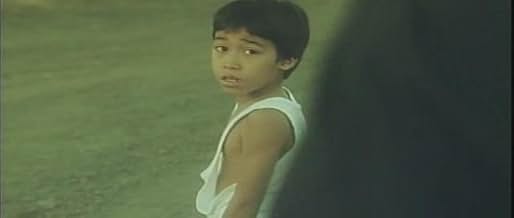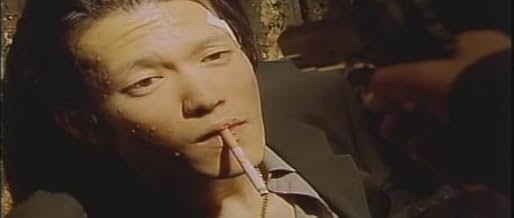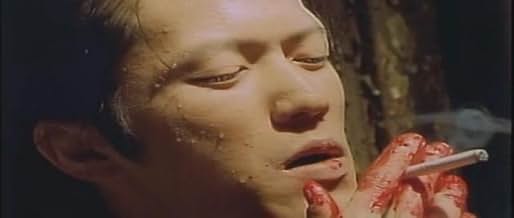Blues Harp
- 1998
- 1h 47m
IMDb RATING
7.0/10
1.2K
YOUR RATING
Ambitious yakuza Kenji befriends harmonica-playing bartender Chuji, who moonlights as a part-time drug-dealer for the opposing gang. Their friendship is threatened by Kenji's plans for advan... Read allAmbitious yakuza Kenji befriends harmonica-playing bartender Chuji, who moonlights as a part-time drug-dealer for the opposing gang. Their friendship is threatened by Kenji's plans for advancement, as well as by his bodyguard's growing jealousy of Chuji.Ambitious yakuza Kenji befriends harmonica-playing bartender Chuji, who moonlights as a part-time drug-dealer for the opposing gang. Their friendship is threatened by Kenji's plans for advancement, as well as by his bodyguard's growing jealousy of Chuji.
- Awards
- 1 win
- Director
- Writers
- All cast & crew
- Production, box office & more at IMDbPro
Storyline
Did you know
- SoundtracksNew Coat of Paint
Written by Tom Waits
Featured review
This film had a powerful impact on me. I'm still somewhat new to the yakuza film genre, but it immediately became one of my favorite films, perhaps my favorite Takashi Miike film I have seen so far.
It doesn't really compare to Miike's more famous films because it fits more neatly in to the yakuza and crime genres than Miike's better known stylized shocker exploitation yakuza/psycho films; however, it does have a good deal of the visual style, much of the blood and carnage and some of the blistering action we are accustomed to in Miike's films. And, like most Miike films, it has a cool intro. Also, like most of Miike's best films, it has the coolest and best acting (and actors) you are likely to see in any crime film. Like we have come to expect from Miike films, it has some great mafia boss characters and one or two characters that seem like they are from outer space (though here these eccentrics are more subtle and have less screen time here than in his more famous films).
I more or less liked Miike's well-known stuff like Ichi the Killer and Dead or Alive (especially DOA's first 10 minutes or so) and I especially liked Fudoh and Audition, but I have to say I prefer this kind of film more because it has so much soul and grit and it feels real. The story has a classic feel to it like something out of the more edgy film noirs or some of the best gritty 1970s crime/druggie movies. Unlike in most any other Takashi Miike film I have seen so far, you actually care about the lead characters in this film.
Of course I won't divulge the whole story, but I set it up below. The plot is a little bit complicated, though it is one one of the best stories I have ever come across in a crime movie (my set-up below doesn't do it justice). Don't read the two paragraphs below if you prefer to know as little about the story as possible.
STORY SET-UP
Story is about a young Okinawa drug dealer named Chuji who also works at a bar that features local Japanese rock and roll bands. But Chuji is also a gifted harmonica player, which he learned to play as a young boy out of loneliness and boredom while his prostitute mother turned tricks. While helping a young and ambitious yakuza named Kenji elude the capture of the gang headed by Chuji's boss, Chuji also incidentally meets a pretty girl who later becomes his girlfriend. She, as well as one of the leaders of one of the bands performing at the bar, encourages Chuji to play harmonica with his band. After only one performance, Chuji is instantly popular at the bar for his blues harp skills. His talent later attracts the attention of a record producer. It looks like Chuji might no longer have to deal drugs, but...
Kenji, the yakuza formerly on the run, rewards Chuji for his help at eluding capture and certain execution earlier. The two become friends -- though, unbeknownst to Chuji, Kenji's affection for him is more than just friendly. But because they each work for rival gangs, and because Kenji's yakuza ambitions exceed his status and his closeted homosexuality offends certain people close to him, Kenji's life is on the line, and Chuji obliviously and unwittingly gets tangled up in a yakuza battle way over his head.
END OF STORY SET-UP
Like I started to mention earlier, the story and characters have such a classic feel to them that I wonder if there are any classic noirs or 70s crime films with similar plots. If so, I'm curious to find out what they are. But I suspect the story probably feels so classic just because it is so good. Some Miike films are confusing, often deliberately so, and I usually appreciate his narrative haphazardness. But here, unexpectedly, we're treated to something of a classic crime tale. I know I am overusing the word "classic," but by the end of the film I felt like Charles Dickens could have written the same basic plot though in a very different style and different characters of course.
I want to call it a crime masterpiece; but I feel like it's a bit premature for me to make such a declaration since I need to see some more films first -- even more Takashi Miike films since he must be one of the most prolific directors in the history of feature filmmaking. But unlike most crime movies which often tend to be flashy and filled with a lot of attitude and crammed with forgettable action, this film has an emotional depth to it that most anyone can relate to (in addition to all the cool shoot outs, etc.). Many women would like this film too because there is a really good, and very simple, love story at the center of the film that is quite sweet; and the lead female character genuinely loves and devotes herself to Chuji as he does to her as well. This is how young love should be. This film busts the gut and excites the senses; but it also rattles the soul and pierces the heart. Many of the best Japanese filmmakers frequently seem to have a talent for combining on screen action and physicality with a depth of emotion and feeling that seems rare in filmmakers (and screenwriters) in other nations. Takashi Miike struts his stuff here in this regard. A film like this reminds me of why I love Japanese movies so much and why I think Japanese film in general is a treasure chest still waiting to be discovered -- maybe even by many Japanese people themselves as well.
I am not quite yet ready to call it a crime masterpiece. I at least need to see some more Takashi Miike films first. But damn if I really want to call it a crime masterpiece. Incidentally, it might even be a great story about love too. Nah - Takashi Miike couldn't be capable of a great love story even if it does have gangsters, guns and bullets. Could he?
It doesn't really compare to Miike's more famous films because it fits more neatly in to the yakuza and crime genres than Miike's better known stylized shocker exploitation yakuza/psycho films; however, it does have a good deal of the visual style, much of the blood and carnage and some of the blistering action we are accustomed to in Miike's films. And, like most Miike films, it has a cool intro. Also, like most of Miike's best films, it has the coolest and best acting (and actors) you are likely to see in any crime film. Like we have come to expect from Miike films, it has some great mafia boss characters and one or two characters that seem like they are from outer space (though here these eccentrics are more subtle and have less screen time here than in his more famous films).
I more or less liked Miike's well-known stuff like Ichi the Killer and Dead or Alive (especially DOA's first 10 minutes or so) and I especially liked Fudoh and Audition, but I have to say I prefer this kind of film more because it has so much soul and grit and it feels real. The story has a classic feel to it like something out of the more edgy film noirs or some of the best gritty 1970s crime/druggie movies. Unlike in most any other Takashi Miike film I have seen so far, you actually care about the lead characters in this film.
Of course I won't divulge the whole story, but I set it up below. The plot is a little bit complicated, though it is one one of the best stories I have ever come across in a crime movie (my set-up below doesn't do it justice). Don't read the two paragraphs below if you prefer to know as little about the story as possible.
STORY SET-UP
Story is about a young Okinawa drug dealer named Chuji who also works at a bar that features local Japanese rock and roll bands. But Chuji is also a gifted harmonica player, which he learned to play as a young boy out of loneliness and boredom while his prostitute mother turned tricks. While helping a young and ambitious yakuza named Kenji elude the capture of the gang headed by Chuji's boss, Chuji also incidentally meets a pretty girl who later becomes his girlfriend. She, as well as one of the leaders of one of the bands performing at the bar, encourages Chuji to play harmonica with his band. After only one performance, Chuji is instantly popular at the bar for his blues harp skills. His talent later attracts the attention of a record producer. It looks like Chuji might no longer have to deal drugs, but...
Kenji, the yakuza formerly on the run, rewards Chuji for his help at eluding capture and certain execution earlier. The two become friends -- though, unbeknownst to Chuji, Kenji's affection for him is more than just friendly. But because they each work for rival gangs, and because Kenji's yakuza ambitions exceed his status and his closeted homosexuality offends certain people close to him, Kenji's life is on the line, and Chuji obliviously and unwittingly gets tangled up in a yakuza battle way over his head.
END OF STORY SET-UP
Like I started to mention earlier, the story and characters have such a classic feel to them that I wonder if there are any classic noirs or 70s crime films with similar plots. If so, I'm curious to find out what they are. But I suspect the story probably feels so classic just because it is so good. Some Miike films are confusing, often deliberately so, and I usually appreciate his narrative haphazardness. But here, unexpectedly, we're treated to something of a classic crime tale. I know I am overusing the word "classic," but by the end of the film I felt like Charles Dickens could have written the same basic plot though in a very different style and different characters of course.
I want to call it a crime masterpiece; but I feel like it's a bit premature for me to make such a declaration since I need to see some more films first -- even more Takashi Miike films since he must be one of the most prolific directors in the history of feature filmmaking. But unlike most crime movies which often tend to be flashy and filled with a lot of attitude and crammed with forgettable action, this film has an emotional depth to it that most anyone can relate to (in addition to all the cool shoot outs, etc.). Many women would like this film too because there is a really good, and very simple, love story at the center of the film that is quite sweet; and the lead female character genuinely loves and devotes herself to Chuji as he does to her as well. This is how young love should be. This film busts the gut and excites the senses; but it also rattles the soul and pierces the heart. Many of the best Japanese filmmakers frequently seem to have a talent for combining on screen action and physicality with a depth of emotion and feeling that seems rare in filmmakers (and screenwriters) in other nations. Takashi Miike struts his stuff here in this regard. A film like this reminds me of why I love Japanese movies so much and why I think Japanese film in general is a treasure chest still waiting to be discovered -- maybe even by many Japanese people themselves as well.
I am not quite yet ready to call it a crime masterpiece. I at least need to see some more Takashi Miike films first. But damn if I really want to call it a crime masterpiece. Incidentally, it might even be a great story about love too. Nah - Takashi Miike couldn't be capable of a great love story even if it does have gangsters, guns and bullets. Could he?
- enicholson
- Jan 14, 2004
- Permalink
Details
- Release date
- Country of origin
- Language
- Also known as
- Блюз-гармоника
- Production company
- See more company credits at IMDbPro
- Runtime1 hour 47 minutes
- Color
Contribute to this page
Suggest an edit or add missing content








